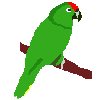Mr Barrie says the classes
Are distinguished from the masses
For this reason, that their meal-times
Number nearly half a score.
Thought the Parrot, “Ah, precisely.
That may suit them now quite nicely,
Soon they’ll spare their Little Marys, 1
For Their food will cost them more.”
When he shirked his daily ration
Succi caused a great sensation, 2
And “I wonder why he does it?”
Asked each puzzled visitor.
But the Parrot thought, explaining,
“Why, he must get into training,
For he knows that in the future
All his food will cost him more.”
On the other hand, a glutton
After finishing the mutton,
Swallowed steak and fried potatoes
Till he fell upon the floor.
To rebukes he made this answer,
“I must take in all I can sir;
Though it’s cheap enough at present,
Food is going to cost you more.”
And the Parrot, as he eyed him,
With congratulation plied him;
“If you die of apoplexy
Your demise we’ll all deplore.
But keep tucking in at present,
(Try a little wing of pheasant?)
You will have few other chances,
For Your food will cost you more.”
See poem 06.
2Giovanni Succi was an Italian who, in the late 19th century, achieved notoriety by undertaking prolonged fasts for exhibition purposes. In 1888 he completed a fast lasting 30 days in Florence. On 17 March 1890, he began a 40 days’ fast at the Westminster Aquarium, London. The Times, in its issue of 28 April 1890, reported that
the end of the 40 days came at 3 o’clock on Saturday; but it was not until nearly 5 o’clock that he broke his fast. A very high charge was made on Saturday to his receptions, and the stalls and seats were raised in price at the time when the first meal was to be eaten. This performance was held on the stage. A table was set out in the centre of the stage, and a company of gentleman had ranged themselves behind it. [. . .] The chairman of the company then made an address, somewhat long considering the circumstances that Succi had been without food for 40 days and was naturally anxious to end his time of trial.
In its editorial, the Times was forthright:
On the one side, human endurance pushed to an extreme, with no sufficient motive and for no high cause; and on the other side, an idle morbid curiosity—these sum up between them what the late show has been. It has been degrading to all concerned in it.
Just over 18 months later, Succi was back in London, attempting to fast for 52 days. But on 30 January 1892, the Times reported that he had abandoned the attempt during the 44th day, when his condition became critical and he was medically advised not to continue. During the 1890s, there was a minor a craze for fasting exhibitions and Succi faced competion from two other ‘professional fasters’, another Italian, Stephano Merlatti, and a Frenchman, Alexandre Jacques. In 1898 it was reported that Succi was in Turin, where he was undertaking his 71st prolonged fast.

